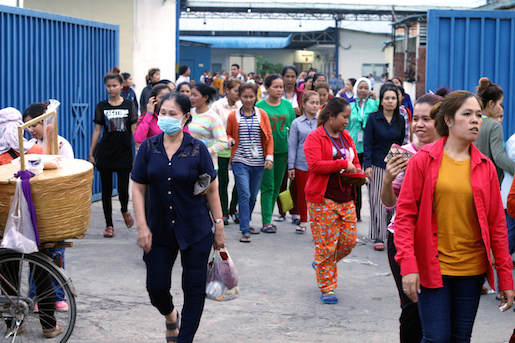Poverty drives wages down
Phnom Penh. H&M has made promises to raise wage levels and increase worker influence in the garment factories of Cambodia. The validity of these supposed ambitions is being criticized. ”What have they actually achieved? Nothing!”, says Sajsa Beslik, sustainibility banker at Swedish Nordea.
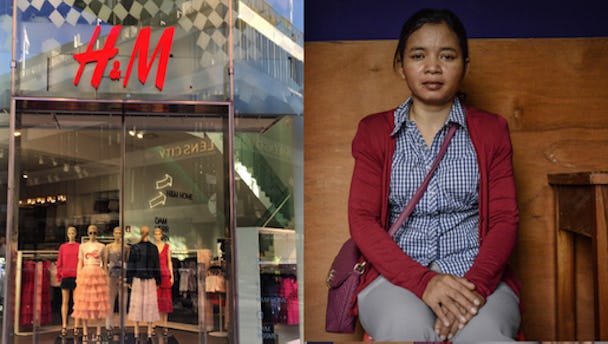
At night, mosquitos make their ways through the crack of air between the corrugated metal roof and the aged plaster of the cement wall, untroubled by a long row of steel doors.
Seng Chhun Leng, 26, opens the padlock on her street level 15 square meter room. Several mattresses line the floor. She sleeps here together with her younger brother and his fiancée. She recently moved out of a room that cost just over 50 dollars per month.
”This was cheaper, just over 40 dollars, so I chose it instead”
She lives in the Toul Sangke area, part of Cambodia’s sprawling capital city Phnom Penh. It’s late afternoon. A few hours before dusk.
Seng Chhun Leng has just come home from the Roo Hsing Garment factory where she has sewn seams on 1150 short pants for delivery to the Swedish fashion retailer H&M. She knows her exact numbers of production as she is paid on a fixed piece rate.
One month of work brings in an income of around 170 dollars which includes bonuses. Rent and electricity cost around 50 dollars. Food comes to double of that. She also needs to help her parents.
Money is tight.
The factory is a ten minute walk from the little windowless room. The long low-rise factory building is surrounded by a fence.
A road runs along the fence, where street vendors call attention to their small stalls stocked with vegetables, fish and meat on display.
Inside the fence, 3700 textile workers make clothes. Mainly for H&M but also for other Western fashion retailers.
Seng Chhun Leng has worked here for two years. Just a week before Arbetet Global’s visit, her contract was once again extended.
Her situation is precarious. Right now, she knows her paychecks will come. But at the end of June she will once again have to hold her breath in nervous worry.
This same process happens every third month, forcing her to think the same anxious thoughts. Will her contract be extended? Will she keep her job and income?
Her factory, like many others in the garment manufacturing sector, has seen workplace pressures increase. There has been media attention to the phenomena of mass fainting. Employees that spontaneously lose consciousness while at their machines.
The reason? Overtime labor, malnutrition and dehydration are offered as explanations as employees do not want to waste their precious working hours, not even to visit to toilets. At her factory there has been an improvement as a new ventilation system was installed one year ago.
But a workmate of Seng Chhun Leng, who joins us, reveals that workers still faint. ”It happens perhaps once or twice a month”
***
”I responded by sending 5 gigabytes of porn and other spam. If they terrorize me again, I’ll strike back”.
Arbetet Global visits Ken Loo at the office of the trade organization Garment Manufacturers Association in Cambodia, Gmac.
Ken Loo is Secretary General and has sat himself at a gigantic conference table which looks like a battleship. The porn comment has its own background.
On the 3rd of January 2014 garment workers clashed with police and military as they demonstrated against harsh working conditions. Four people were killed and one person went ’missing’.
Many were detained and beaten by the police. Unions and human rights organisations protested strongly. Mass emails followed, directed, among others, to Ken Loo who represents the employers. He struck back with porn.
”They are militant. And corrupt. There isn’t a single union activist who does not take bribes”. His perception of the unions is very negative.
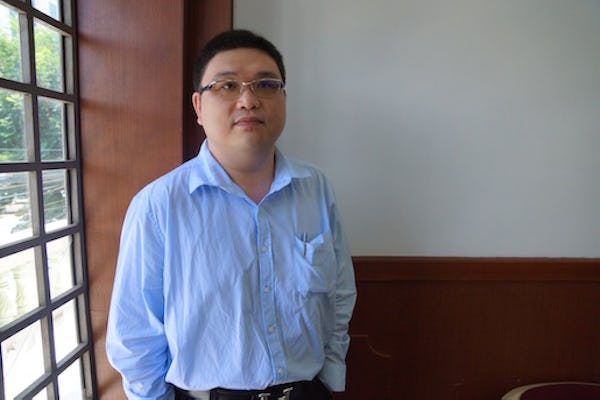
Ken Loo, Gmac. Photo: Erik Larsson
It is true that corruption is widespread and Cambodia has it among the worst in the world. Transparency International rates the degree of corruption in different countries and ranks Cambodia as 156 out of 176.
The political system in particular is considered to be ”extremely corrupt” and bribes are commonplace even in courts and in judicial processes. Transparency International does not mention the unions much, but does focus on the private sector a lot, pointing to ubiquitous corruption there.
To do business in Cambodia, almost every business has to pay bribes.
On hearing questions about the protests against working conditions, he tries to turn the perspective and claims that compared to neighboring countries, the situation in Cambodia is better.
”We have the best conditions”
When he again is asked about the harsh working conditions, he gets agitated and stretches his hand out.
”I’ll give you one million dollars if you can prove that conditions are worse here than in other countries”.
He leans forward to shake hands.
”You will get one million dollars”, he repeats, ”but if you fail, you would have to pay 10000 dollars to me.”
He continues by saying that everyone wants more pay.
”If you go to the boss and demand a raise of 5000 dollars, he would tell you to go to hell. It is the market that sets prices and salaries. I am not saying that the workers do not have a tough job. They do! But if the wages go up, the industry will move to Bangladesh or some other country.
***
Seamstress Noy Saran has just gotten a divorce. There isn’t much that is set and steady right now. Her home. Her job. Her salary. Her life.
For the past six years she has worked at the Hong WA Factory in central Phnom Penh.
Arbetet Global comes to the offices of the garment workers union, the Coalition of Cambodian Apparel Workers Democratic Unions C.CAWDU, to meet workers from the textile factories. Noy Saran sits down.
”Yesterday I was sewing childrens pants for H&M”
Unlike many others, she has permanent employment. Even so, she is still insecure.
”It’s because of the divorce, but also because the terms of my contract are renegotiated every six months and even though my employment is permanent, my salary can still be lowered”.
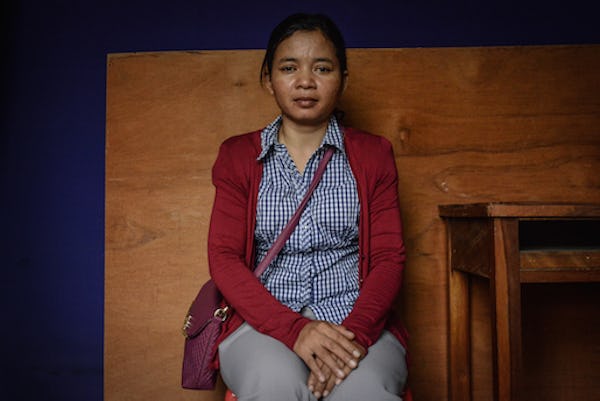
I have just got divorced and now everything is very uncertain even though I have a permenant contract. My employment contract is renegotiated every six month. Noy Saran, at Hong WA Factory. Photo: Lauren Crothers
Noy Saran is an exception. The usual term of employment among most of the textile workers seems to be temporary contracts though, renewable every three months. Piecework wages and short term contracts.
Many of them feel forced to work even when sick so they do not risk their contract renewals.
”I’d like you to write in your newspaper that we want to get rid of them” says Thorn Veasna who works at the H&M subcontractor Roo Hising Garment and is now seated in the union office.
These contracts are what the workers want to discuss. Other workers present agree with him. Short term contracts make life difficult.
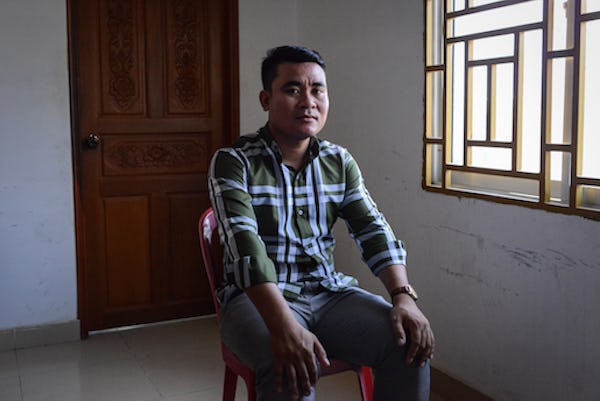
Short term contracts make life uncertain, says Thorn Veasna who works for H&M’s subcontractor Roo Hsing Garment. Photo: Lauren Crothers
Minimum wages have been raised several times in recent years.
Economists that choose to look only at aggregate growth figures for the Cambodian economy should be pleased. The annual growth rate is at 7-8%. The frequent sightings of city jeeps on the streets of Phnom Penh are testament to that. Haven’t things improved?
”That hardly makes a difference” the workers retort. Several of them point to the way wage increases lead to rents going up. Making ends meet is hard.
City jeeps do not drive on all the streets of the city. They’re not seen in the slums. They don’t drive past the shanty town buildings made of boards and tarps where people try to find a living sorting through litter and picking lotus roots.
Cambodia is one of Asia’s poorest countries and poverty functions as a huge weight pushing wages down.
***
She smiles at the camera as she measures the width of the throat of a shop dummy. The photos in H&M’s latest report on sustainability display workers with relaxed and open expressions. All graphs and diagrams are pointing in the right direction. Things are going well.
Arbetet Global reads that H&M have a target of offering ”fair jobs” and forming inclusive workplaces open to diversity.
Furthermore next year, of all the garment producing subcontractors, half will have some form of worker representation in management. Half of all subcontractors will also have introduced a Living Wage policy.
The H&M corporation promote and try to spread a system for social dialogue that in the last year has taken a considerable step forward, from the previous 132 subcontractors worldwide to last year’s 290.
In Cambodia, the Swedish fashion giant is participating in a project for improved working conditions at factories. Swedish labor union IF Metall is also involved.
It is a project perfectly aligned with the Swedish Prime Minister Stefan Löfven’s vision of “Global Deal”.
This vision is of a deal that would raise workers’ wages at the same time as engaged companies could gain advantages through stability and local economies could develop.
Stefan Löfven usually presents it as a Win-Win-Win situation. Everybody would gain from it. In a way, it is the export of the Swedish model on a global scale. Interest has increased and spread. Cambodia is one of the countries and H&M one of the corporations through which it is to be realized.
In 24 factories a workplace dialogue process has been introduced. In 12 factories, collective bargaining on wages has been agreed on.
Workers from several factories can witness of improved ventilation systems over the past year.
Toum Nai Leng works as stock manager at H&M’s subcontractor Zhong Yin. He used to be a farmer but made the switch three years ago.
“I make about as much as I did before but the factory work is not as strenuous as farming”.
***
He is hungry and about to have his lunch break but still lifts up a pile of papers and waves them in the air. Back at the trade union C.CAWDU, legal expert Vong Vuthy says ”I just received these”.
The pile of papers concern a H&M subcontractor JSD-Textile.
In May 2014 workers protested against the poor conditions. The company replied, not with dialogue, but with mass firings. 128 employees were fired. Eventually the union brought the matter to the H&M corporation, but there was no reaction.
It has been a drawn out process. Of those that protested the working conditions and lost their jobs, there are still 75 that demand to take the process further and are demanding their jobs back.
The process is supposed to restart after this news story has gone to press.
H&M though write in an email that they no longer have business relations with that subcontractor. According to H&M, the relationship ended just after the turn of the year when the factory changed ownership.
It is very hard to gain insight into H&M’s business in Cambodia. Despite numerous and repeated requests, H&M will not permit Arbetet Global to make visits on site.
That refusal even includes the H&M factories that are part of the aid project for improved working conditions funded by Swedish tax money through the Swedish aid agency SIDA.
H&M’s unwillingness to make visible the conditions of everyday work at their subcontractors is corroborated by several journalists.
The Swedish fashion giant describes great improvement in their reports, but it is very hard to find out what happens behind the factory walls.
***
The bang was heard throughout the entire plant as a steam generator exploded.
Witnesses could describe that the container filled with boiling water was hurled a good one hundred meters away before impacting into the cafeteria.
One worker was killed at the Zhen Tai Garment factory, a subcontractor in Phnom Penh to the jeans company Levis.
“The company blame a worker who has been arrested by the police” says Tola Mouen at the human rights organisation the Center for Alliance of Labor and Human Rights, Central.
He has followed developments within the textile industry at close range, and has just got been on the phone after another call about the accident that has kept him busy during the last week.
The development of the textile industry is a key issue for Central as they want the Western garment retailers to put pressure to enact the so called Living Wage in Cambodia.
Video från YouTube
Genom att börja spela videon godkänner du YouTubes dataskydsspolicy.

They seek to find an agreement where set terms can regulate monthly wages to not only cover the costs of rent, food and insurances, but also afford to start a family and to stay home when sick.
Although the Swedish corporation has for some time claimed to be ready to comply with such an agreement, Tola Mouen has grown tired of them just talking about it.
“H&M are very good at promoting themselves, but they are no better than any of the others”
In Sweden the work done by H&M is considered to be successful. The Swedish trade union IF Metall has though as of yet not taken an official position to the project in Cambodia. There are several aspects of the fashion giant’s engagement to consider.
Erik Andersson, international secretary at IF Metall, is of the opinion that it is positive that both H&M and their Spanish competitor Inditex (who include the Zara retailer) have a global framework agreement.
He also compliments H&M on the skill they show in cooperating with SIDA and the UN agency International Labour Organisation.
“They are really on the ball. And that strengthens their brand”
But he also feels that H&M should be able to do a lot more in improving conditions for their employees.
“They should put in tougher regulation on transports. Today, employees can be transported on the back of trucks on muddy roads. Also, H&M should do more to raise wage levels and union representation”
Under the present conditions he questions whether it is appropriate to purchase garments.
“You have to ask yourself whether you should buy from a country like Cambodia at all”, and referring to the increasingly tense political situation in the country, adds “The unions that take critical positions towards the government get banned”.
More and more people are concerned that while SIDA, H&M and IF Metall are attempting to increase social dialogue, the country itself is moving further and further toward a one party system.
Last year a law regulating trade and labor unions allowed several unions to be banned due to their criticism of the reigning government party, the Cambodian People’s Party, which has been in power since the downfall of the Khmer Rouge in 1979.
Tensions have been rising as there are indications that there is support for a shift of power in next year’s parliamentary elections. There are also upcoming local elections in June.
Recently a bill on minimum wages was put forth which could make union strikes illegal and which would even outlaw the gathering of wage statistics.
Such harsher measures used to curtail the influence of unions and human rights organisations will certainly lead to divisions.
Erik Andersson adds “If I was in H&M top management I would be more self-critical and modest”.
The fact that the unions are critical of the terms that the employers support is not unusual, but the unusual aspect is that banks and financial institutions have joined them in criticizing the poor working conditions and lack of transparency.
One example is Sasja Beslik, the manager of Sustainable Finance with the Swedish bank Nordea. Last year he was awarded Banker of the year in 2016 by the financial magazine Privata Affärer.
From his position with Nordea Wealth Management he has followed H&M for some time and has tried to find out what actual improvements they have made for the employees. He finds it hard to draw any conclusions.
“There is no transparency”. There isn’t a financial investor in the world who can validate the claims H&M make.
Sasja Beslik is of the opinion that the perception of H&M’s projects is idealized and there is an unfounded belief in their human rights projects.
“H&M tell me that they have improved working conditions in Cambodia. The only way for me to find out is to go there. Yet if I request to get into their factories, they first say ’no’, and eventually I am offered to take a guided tour together with 40 other investors.
The claims from both the fashion giant and SIDA of increased dialogue and collective bargaining agreements that have been signed locally, are dismissed by Sasja Beslik as succesful PR for H&M.
“This really makes me very angry. What improvements have been achieved? Nothing has gotten better. It’s just bullshit!”
H&M respond: »Minimum wages went up in January«
Read The original swedish version
Cambodia
Population: 16 million (2016)
Language: Khmer
Religion: Buddhism
Government: Constitutional monarchy with a multi-party system
Cambodia is one of the poorest countries in Asia. One third of the population lives on income below the national poverty level.
Source: CIA World Factbook
The Textile Industry
• About 800 000 people are employed in the Cambodian textile industry according to the employer’s organisation Gmac.
• Working hours for the Cambodian garment workers that supply H&M with fashion items is 48 hours per week, six days a week. Overtime is common. Total work hours must not go beyond 60 hours over a seven-day period.
• On average an employee at an H&M subcontractor earns 167 dollars per month. The legal minimum wage within the textile industry is 153 dollars, although an added bonus brings it up to 157 dollars.
• H&M has implemented a wage strategy that seeks to increase on site dialogue in work places. Today this is used in 290 factories and covers 380 000 employees. The target is to bring in another 96 factories during 2017.
Sources: H&M, Gmac
The Living Wage
The idea of the Living Wage has attracted more and more support from human rights organizations and trade unions. It is a salary that is high enough to cover an employee’s basic needs, such as food, accommodation, health care and clothes, within the limits of normal working hours.
Today the garment worker in Cambodia has a monthly wage of about 170 dollars, which is considered to be below the estimated 200 dollars per month of the Living Wage.
In Cambodia, the term has gained traction and global labour unions like IndustriAll hope that the Living Wage system can become a reality in Cambodia and then spread to other parts of Asia.
Source: Fair Action, IndustriAll
Translation: Ravi Dar
